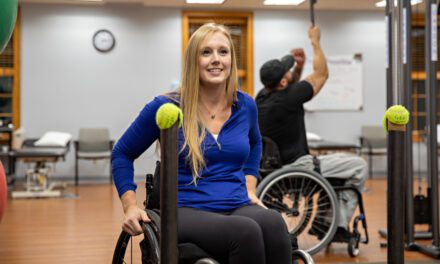
John DeLuca, PhD, vice president for Research and Training at Kessler Foundation, articulates the organization’s excitement regarding the grants. “We look forward to combining our expertise in mobility and cognitive research to take the first step towards finding therapies that will delay deficits in thinking, learning, and memory thought to be associated with the accelerated-aging process in people with SCI.”
A total of $574, 976 for 3 years was reportedly awarded to Gail Forrest, PhD, assistant director of Human Performance and Engineering Research, to study the effect of Ekso-assisted walking on muscle and bone. Forrest aims to pinpoint whether a walking over-ground training protocol with Ekso can reverse negative changes in the muscles and bones of individuals with chronic SCI. The data collected will then be used to design a multisite clinical trial to assess whether robotic exoskeleton training is more effective in improving musculoskeletal outcomes than other current interventions.
A 3-year $596,152 grant will be awarded to Nancy Chiaravalloti, PhD, director of Neuropsychology and Neuroscience and Traumatic Brain Injury Research, and Jill Wecht, EdD, from James J. Peters Veterans Affairs Medical Center. The grant will fund research centered on the impact of aging on cardiovascular, cerebrovascular and cognitive health in SCI patients. The Foundation notes that Trevor Dyson-Hudson, MD, director of Spinal Cord Injury Research, and Glenn Wylie, DPhil, assistant director of Neuroscience Research and the Neuroimaging Center, are co-investigators on the study. The Foundation adds that the study will investigate whether age-associated changes in cardiovascular function contribute to the increased prevalence of cognitive dysfunction in SCI patients.
A 1-year $50,000 grant will go to support the work of Megan Damcott, PhD, postdoctoral fellow in Human Performance and Engineering Research. Damcott will be studying the efficacy of electrical stimulation (ES) in preventing bone loss in SCI patients. She aims to develop a protocol for the use of ES with mechanical walking interventions. Once this protocol has been established, Damcott will pilot a study to test the reliability and sensitivity of ES in preventing loss of bone density.
For more information, visit www.KesslerFoundation.org.
[Source: Kessler Foundation]





